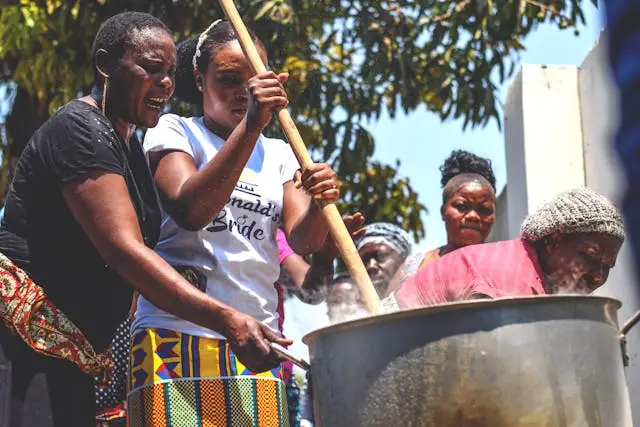The Great Abraka Food Challenge
In the Urhobo town of Oria, Abraka a new phenomenon began to trend. Food wagers were common in the communities spreading from the banks of the River Ethiope. The wager was simple – who could eat a large quantity of food? The wager promoter would announce he would offer one pound ten shillings to anyone who could eat a 3 kg yam cooked with 1 kg of dried fish. Challengers to the wager were not as common as one would have expected.
Most challengers failed to often eat as much as half of the wagered meal. Moreover, one pound ten shillings equals half the monthly wages of a clerk in the colonial civil service. A considerable financial loss. The timidity of challengers coming forward encouraged the promoters to increase the temptations tied to their wagers. The prize money did not change much but the meals became increasing near-irresistible.
A man nearing middle age, Oboden, was at the time incomparably the major food wager promoter. Of average height, a robust stature, and handsome despite the baldness of the front quarter of his head. Oboden owned a shop selling British household goods and provisions. His kerosine refrigerator made the front of his shop the only place in town good for drinking cold drinks.
Oboden had offered any challenger a tempting wager for six weeks but there were no takers. The wager was a meal of a large ogburuane (cockerel) cooked in amiedi (palm-nut soup) eaten with 3 kg of usi (starch meal). Only one quart measure of water was allowed with the meal. That is a lot to enter one’s stomach. It was no surprise the wager was unchallenged for so long.
A man in his late twenties known as Tanigorof had gone to Oboden’s shop one well moon lit evening to drink Andrew Livers Salt with refrigerated water for three pence.
“Are you eating well?” Oboden asked Tanigorof.
“What kind of question is that? Must I announce what I eat to the world,” Tanigorof replies with slight disrespect in his tone.
“It is not as if you buy much at the market?” Oboden says.
“Leave the man alone, he is your customer,” Umukoko, Oboden’s wife tells her husband.
“That wager you have been bragging about I will challenge tomorrow at 5pm but you must give me one and a half hours to finish the food,” Tanigorof says.
The upset customer leaves Oboden and his wife bearing stunned faces.
“You did not talk to him well,” says Umukoko.
“Don’t mind the ekpa (fool). He should go and marry. Tomorrow evening, he will pay me one pound and ten shillings plus the cost of the meal,” Oboden says self-assured.
“Your own is too much, Bobo,” Umukoko tells her husband.
Bobo was the nickname Oboden’s wife and children called him. Bobo is a ghrẹghrẹ name, a corrupted name, children call their father out of childish mispronunciation. The name sticks.
Tanigorof was a tall skinny light-skinned bachelor with a shaggy beard who worked a few miles away with the Post Office (PO).
Oria has a population of just over two thousand people and gossips beats the wind in speed. At least two hundred residents gather to witness Tanigorof’s challenge to the wager. The food was prepared at the side of the store building. The aroma of the amiedi was unmissably sensible within a radius of up to forty yards. The air was carrying scents of palm nuts, spices, herbs and chicken stock.
The sight of the food was most impressive after Umukoko dished it out in three plates on a low table opposite the challenger’s chair. One medium deep plate contained just amiedi, plentiful with its slightly oily face, reddish brown. The second plate, large and deep, held the parts of the cockerel cooked soft. On the third plate, wide and flat, lay the starch meal. A bowl of water finds itself by the side of the table for Tanigorof to wash his hands.
The starch meal was yellow from the palm oil used in making it and looked like a solid hemisphere. As was the tradition the starch meal server divides it into two with a wet hand forefinger to thumb making it look like two cheeks of the same backside. All three plates were steaming.
Some of the gathered spectators had no choice but to mimic Tanigorof’s eating and swallowing, perhaps unconsciously. More experienced spectators who had witnessed previous contest came with a snack handy to tackle any unrestrained salivation.
Tanigorof now sat bare chested to begin his challenge. Starch meal is a malleable gel meaning you could not take a piece to dip in soup before swallowing like you would eba (toasted cassava meal cooked in hot water) or pounded-yam. You had to use your forefinger to press the outer starch meal hard to the plate and use the friction to separate a piece of starch for dipping. This cut and pull away technique is easy to master. Yet, Tanigorof demonstrates a novel way of cutting starch. After creating the friction between the plate and forefinger he twists his wrist as if picking up a snail or periwinkle.
The challenger starts the meal slowly and purposefully like he was doing something that requires great diligence. Tanigorof makes intimate eye contact with every spectator he can as he eats. A few minutes into the meal the youngsters in the crowd would produce the sound “Krọr,” anytime he would pick a piece of starch meal.
“Look if you cannot behave yourself go somewhere else. You must never mock, humiliate or criticise a challenger during a challenge,” Oboden stands up to yell at the spectators.
The Krọr sound stops. However, anyone with the power of clairaudience would hear the spectators saying Krọr in their minds each time Tanigorof cuts a piece of starch meal.
“Krọr. Krọr. Krọr.”
As if by stealth Tanigorof finishes off the half of the starch meal on his plate. That was a quarter of the starch gone. He takes a little sip of water from the full enamel cup of water then stands up from his chair.
“You cannot go anywhere during the challenge,” Oboden cautions the challenger.
Tanigorof responds by passing wind loudly from his backside before sitting back down.
The crowd does not laugh much. Probably, they would laugh endlessly about it when telling the story of the challenge later and so forever if it earns a place for itself in the canons of Abraka or Urhobo folklore. The wind-passing incident did not exceed six seconds. The sound was part shearing sprint and part sluggish rumble giving the feel of much air escaping in so short a time.
Boys will be boys. From among a group of four late teenagers someone echoes Tanigorof with a brief wind explosion of his own. All attention shifts to the four boys. The guilty look on Sedẹvọ face may lead some to suspect he dealt it. Alas, Govinor was standing by his side. Govinor and his father, Obire, could represent Abraka or Urhoboland in garrulous wind-passing contests with honours won.
Attention fast returns to Tanigorof. As he resumes his demeanour of serious professionalism in continuing the contest.
“Krọr. Krọr. Krọr.”
The second half of the starch meal disappears with amiedi into Tanigorof’s stomach which remains flat. Tanigorof lights a cigarette, the filter-less John Players Gold Leaf. He takes several slow long puffs burning it half way.
“Smoking assists in digestion,” Oboden says standing up in protest.
Makeze, an enlightened and travelled elder, miscalled after an English clergyman named Rev Mackenzie steps in to resolve the matter.
“Cigarettes do not digest food but they only give a good sense of satisfaction especially after eating meals to smokers,” Makeze counsels.
Makeze’s counsel stands and Oboden relents. Meanwhile, the remaining half of the cigarette Tanigorof safekeeps on the top cleft of his left ear.
In little under half an hour, the midpoint of the challenge arrives. Ọmatie, Oboden’s only daughter produces another plate of hot steamy starch meal.
Tanigorof relaxes for ten minutes for the starch meal to cool again.
The challenger continues to make intimate eye contact with spectators as he eats.
“Krọr. Krọr. Krọr.”
The third quarter of the starch meal loses its existence to Tanigorof, at the same pace he consumed the first two quarters he polishes off the third. Meanwhile, as he begins the last quarter of the starch meal his eating style changes. Tanigorof starts to use each piece of starch meal he cuts to gather much more soup to it before he swallows it. In-between swallowing he would lick soup gathered by his finger making noisy licking sounds that ends with a loud suck. The licking sounds are not new, people use them to signify they are overly enjoying a meal.
Otherwise, the once smug smile and countenance of Oboden lips smiling and nostrils flaring turns into a nervous frustration. His face is now oriented southwards and tight. It looks like Tanigorof will win the wager but he still has far to go.
“Krọr. Krọr. Krọr.”
Surprisingly, the challenger not only finishes the starch meal he licks all the soup in the medium deep plate. All that remains of the wagered food in the large deep plate is the parts of cooked cockerel in it and a little soup.
“Is the starch plate and soup completely empty?” Tanigorof asks the spectators.
“Yes o!” the spectators reply.
“My Senior, Oboden, do you agree that the starch plate and soup plate are empty.”
“Yes,” Oboden replies with reluctance.
The challenger now pulls the plate of the cockerel closer towards himself. He starts with the ugbowor (thigh) of the cockerel. First, he eats the flesh of the thigh with much visible delight. Then uses his teeth to crack to bone left and his mouth to suck the bone marrow like it was the sweetest bit. Next, he chooses the tail of the cockerel but does a more devastating job to that piece, swallowing everting.
Oboden stands to interrupt Tanigorof continuing the end part of the meal.
“You have won the bet, you don’t have to eat the rest of the food,” Oboden declares trying to take the plate with the remainder of the cockerel away from the challenger.
“Eh!!!,” Tanigorof screams out like the shriek of a dreaded monster on a keen vengeance mission and scares Oboden into leaving the plate to the challenger.
“Owuwvẹ!” A few spectators exclaim.
Owuwvẹ is the Guardian Angel of Abraka only uttered in matters of extreme danger. Tanigorof scream had to be that haunting.
The challenger, Tanigorof, proceeds to eat all the cockerel’s flesh, crack all its bones and suck all the bone marrow dry. His stomach now shows signs of enlargement.
Nevertheless, the half-smoked cigarette gets a lighting by Tanigorof again and he smokes it all slower than the first time. He has a drink of water and sighs only to smack his belly violently, kpoin, before uttering his last words of the challenge. “Ke ghwai den (Just about right).”
It appears Tanigorof food wager success now lives in the canons of Urhobo folklore. We can now laugh about his wind-passing over drinks.
Guynes!
Grimot Nane

